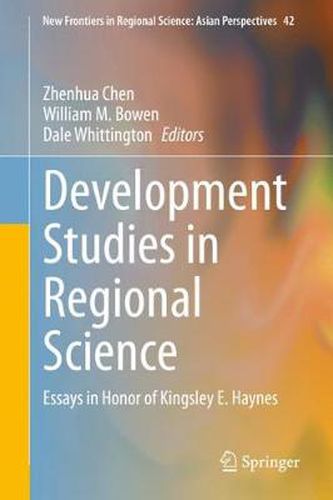Readings Newsletter
Become a Readings Member to make your shopping experience even easier.
Sign in or sign up for free!
You’re not far away from qualifying for FREE standard shipping within Australia
You’ve qualified for FREE standard shipping within Australia
The cart is loading…






This title is printed to order. This book may have been self-published. If so, we cannot guarantee the quality of the content. In the main most books will have gone through the editing process however some may not. We therefore suggest that you be aware of this before ordering this book. If in doubt check either the author or publisher’s details as we are unable to accept any returns unless they are faulty. Please contact us if you have any questions.
This book examines major policy and planning issues in development studies from the regional science perspective. It investigates questions such as: How are communities able to deal with uncertainties raised by conflicts, technology, and external shocks in the process of development? ; How can nations achieve sustainable development in terms of resource allocation and management? ; and How can developing countries improve their economic competitiveness while maintaining the objectives of equitable and coordinated growth among different regions? using case studies that focus on different subfields, like infrastructure, environment, data science, sustainability and resilience. The book is organized in three parts. Part I clarifies fundamental issues regarding development studies and regional science in general, while Part II includes several case studies that address development-related opportunities and challenges with a focus on Asian countries. Lastly, Part III offers a global perspective and explores development experiences from countries throughout the world. Featuring contributions by leading academics and practitioners working at various organizations linked to international development, and including multidisciplinary analyses, the book appeals to students who are interested in development studies and regional science. It also offers planners and policymakers fresh insights into regional economic development.
$9.00 standard shipping within Australia
FREE standard shipping within Australia for orders over $100.00
Express & International shipping calculated at checkout
This title is printed to order. This book may have been self-published. If so, we cannot guarantee the quality of the content. In the main most books will have gone through the editing process however some may not. We therefore suggest that you be aware of this before ordering this book. If in doubt check either the author or publisher’s details as we are unable to accept any returns unless they are faulty. Please contact us if you have any questions.
This book examines major policy and planning issues in development studies from the regional science perspective. It investigates questions such as: How are communities able to deal with uncertainties raised by conflicts, technology, and external shocks in the process of development? ; How can nations achieve sustainable development in terms of resource allocation and management? ; and How can developing countries improve their economic competitiveness while maintaining the objectives of equitable and coordinated growth among different regions? using case studies that focus on different subfields, like infrastructure, environment, data science, sustainability and resilience. The book is organized in three parts. Part I clarifies fundamental issues regarding development studies and regional science in general, while Part II includes several case studies that address development-related opportunities and challenges with a focus on Asian countries. Lastly, Part III offers a global perspective and explores development experiences from countries throughout the world. Featuring contributions by leading academics and practitioners working at various organizations linked to international development, and including multidisciplinary analyses, the book appeals to students who are interested in development studies and regional science. It also offers planners and policymakers fresh insights into regional economic development.